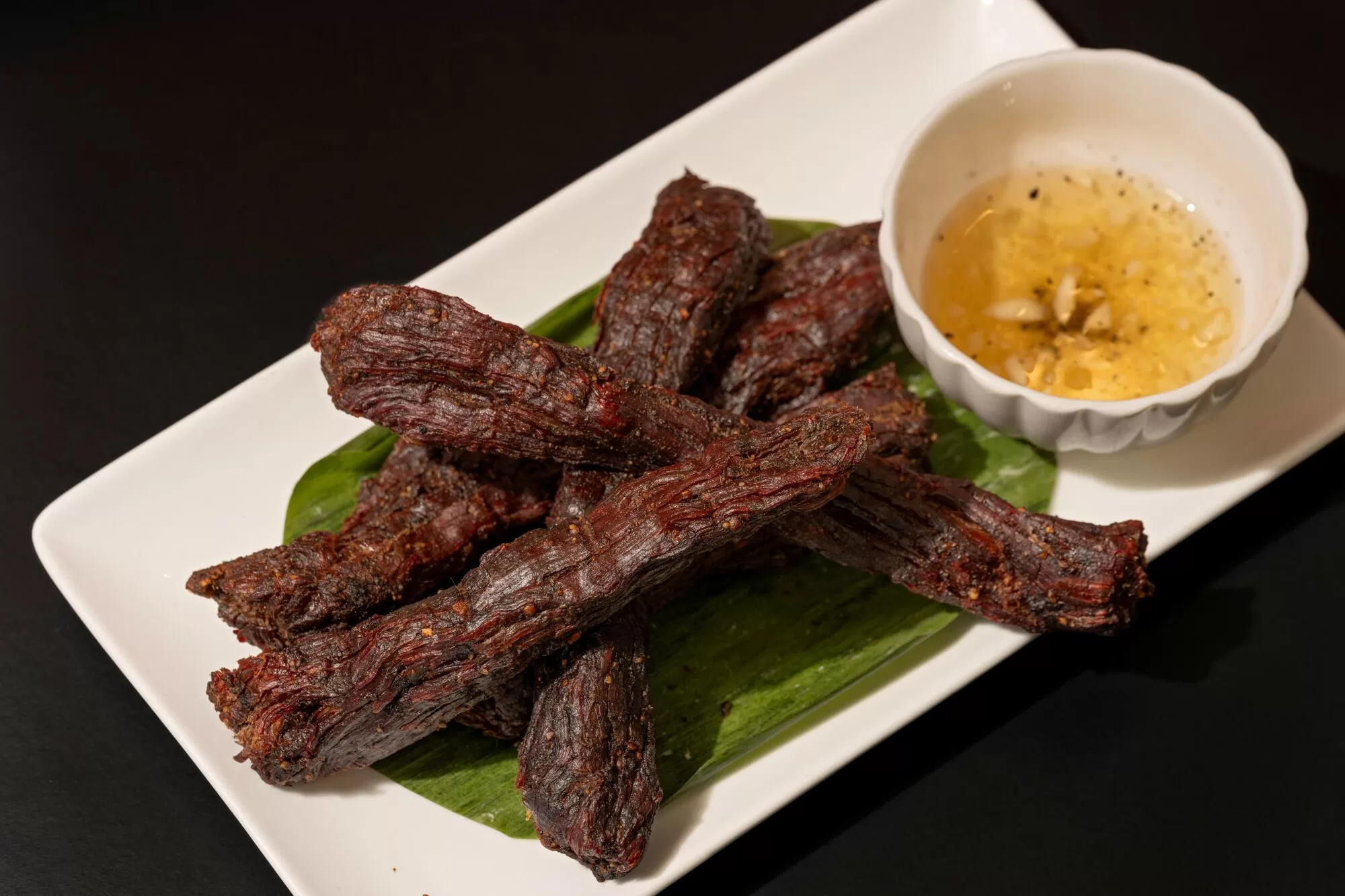But in all my decades as a beef jerky connoisseur, I’d never had jerky like the one at Sophy’s: Cambodian Town Food & Music in Long Beach. And unless you frequent this restaurant on the outskirts of Cambodia Town, I’m guessing you probably haven’t either.
Chef Sophy Khut’s jerky appears on the plate as hefty, six-inch slabs of steak. They’ve undergone a sort of meaty glow-up that involves six hands and two hours of fuss. Three people take turns working the wet marinade into the flank steak, passing it around every 20 minutes until all the liquid has been absorbed.
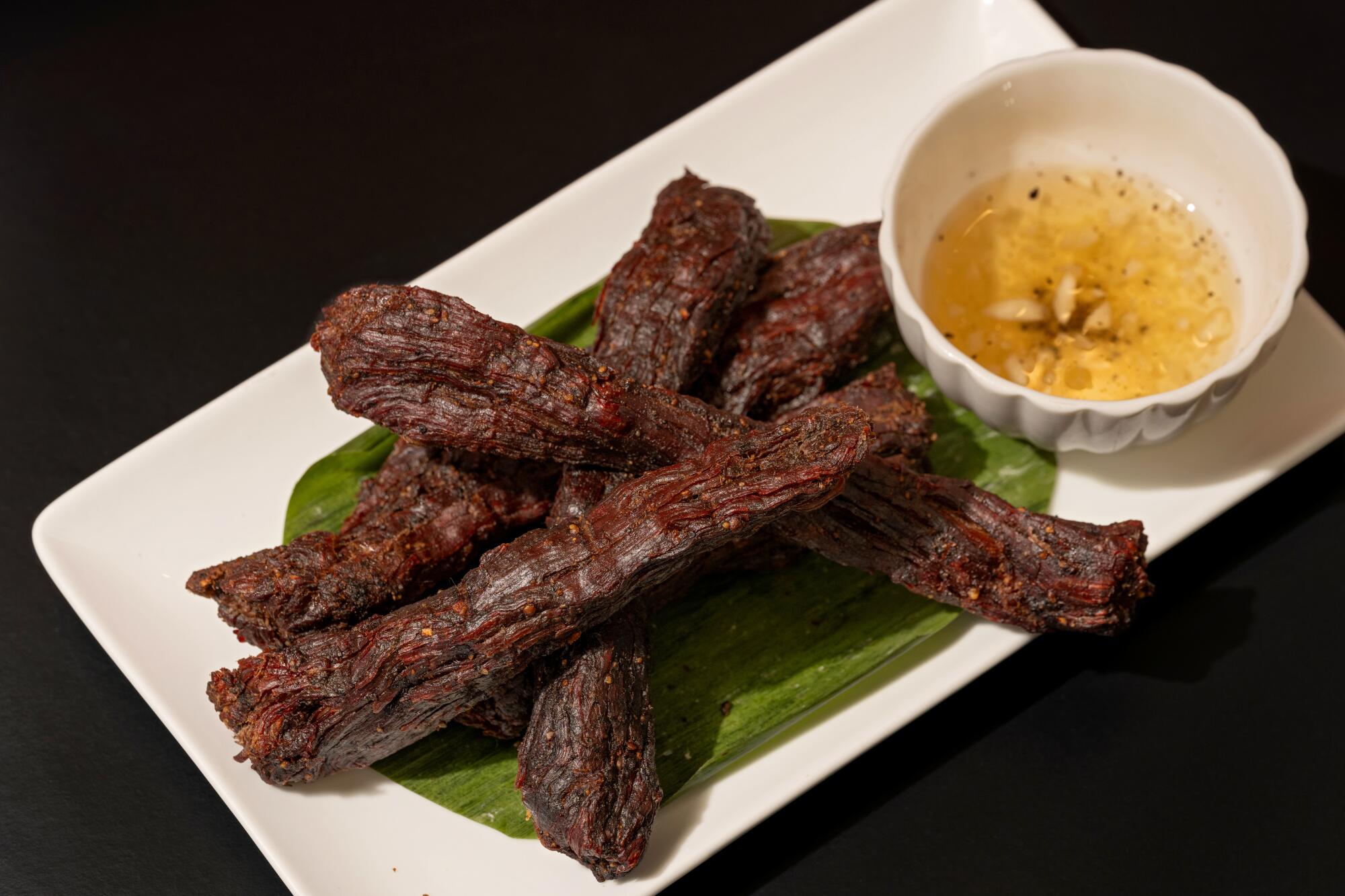
(Ron De Angelis / For The Times)
The beef is dried, vacuum-sealed and then fried before service, allowing for crusty edges you can peel away like string cheese. It eats like tender beef ribs, the meat saturated in a garlicky marinade heavy with ginger, black pepper, fish sauce and just a hint of sugar. A hush falls over the table as people gnaw on their sticks, their heads cocked and their mouths busy.
You dip the meat into a cloudy sauce sharpened with vinegar and hot with black pepper. Khut uses peppercorns from the Kampot region in Cambodia prized for the strength of their flavor and aroma.
I greedily dunked my strips into the condiment, eager to get as much onto the strands as possible without actually submerging my entire hand in the bowl. Imagine salt and vinegar chips in liquid form. You may want to request a ramekin per person at your table.
Some of Sophy’s menu items are what you might expect from your neighborhood Thai pho joint. Cambodia shares a border, as well as some ingredients and techniques, with Vietnam and Thailand. But despite the obvious overlap, Cambodia’s cuisine is distinct, with more funk and less spice than that of its neighbors.
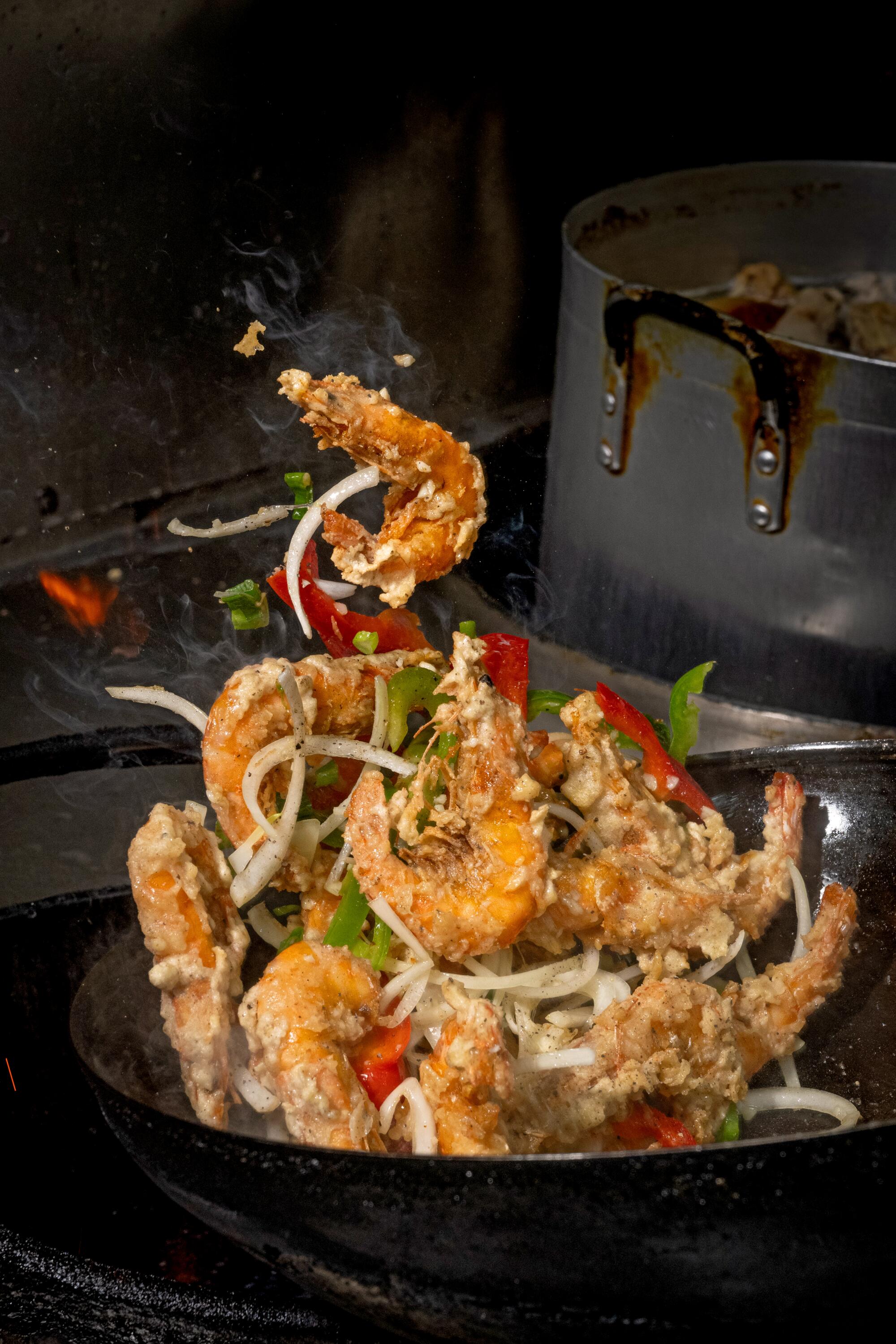
Salt and pepper shrimp being tossed in a wok in the kitchen at Sophy’s: Cambodia Town Food & Music.
(Ron De Angelis / For The Times)
Khut comes from a long line of entrepreneurs who ran restaurants and a wedding catering service in the Siem Reap province of northwestern Cambodia. It’s an area that’s home to Angkor Wat, the eighth wonder of the world. There’s a beautiful image of the temple and its jagged sandstone peaks on one wall in the dining room.
Sophy’s is a restaurant that feels very much like my Asian grandmother’s house: cluttered but clean, no apparent organization to the plants at the back (and only) entrance, multiple Buddhas and scattered Christmas lights in March.
Khut opened her first restaurant in Oregon after finishing school there but was coaxed to California by friends who told her about the large population of Cambodian people in Long Beach, the highest concentration outside the country. She took over a small diner called Ruth’s Country Kitchen on Anaheim Street, which is where the first wave of Long Beach’s Cambodian restaurants was clustered.
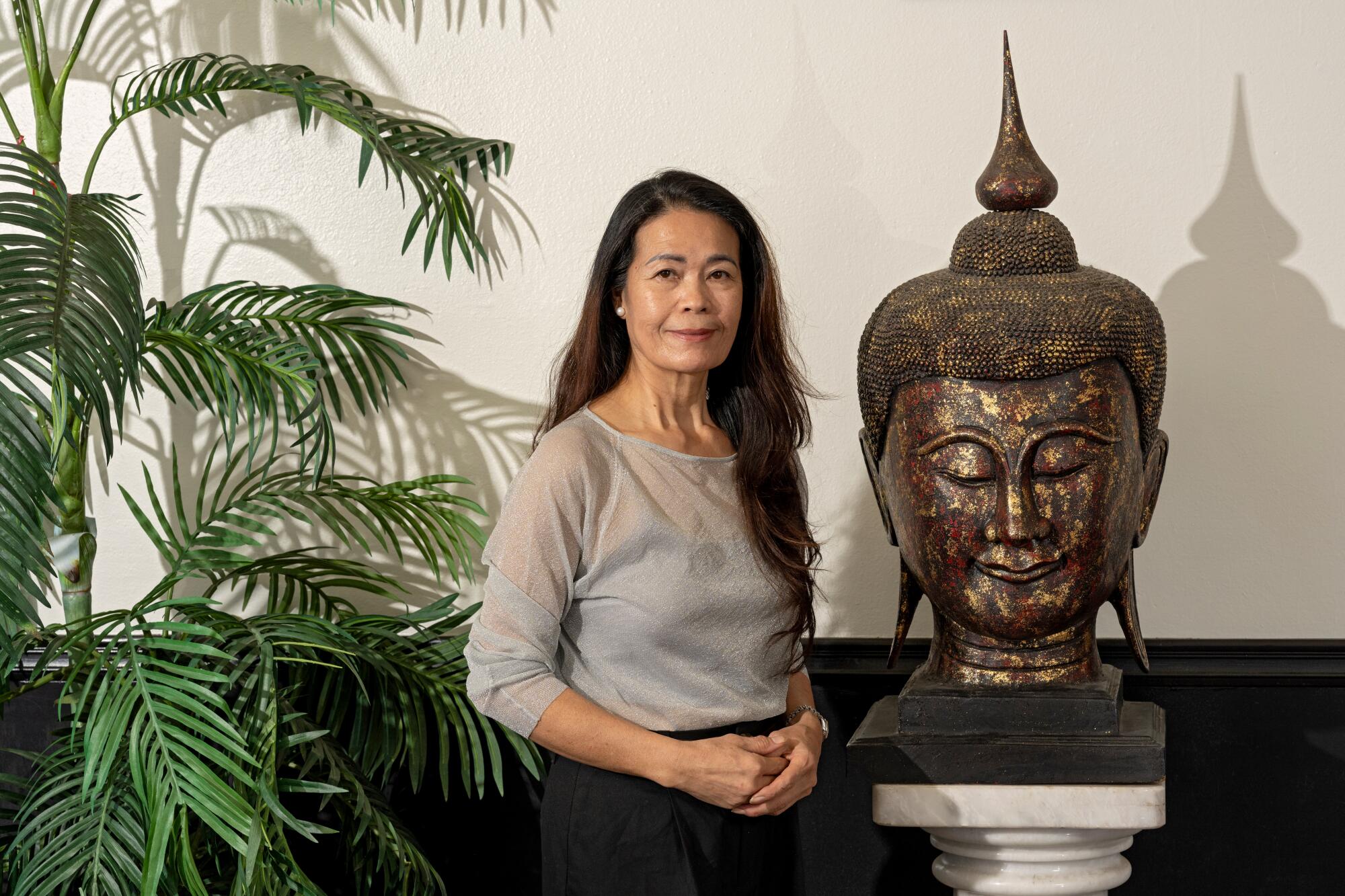
Chef Sophy Khut at Sophy’s: Cambodia Town Food & Music.
(Ron De Angelis / For The Times)
In the fall of 2000, she transitioned the menu from eggs and bacon to Cambodian food and renamed the restaurant Sophy’s. A few years later, she moved to her current location on Pacific Coast Highway and later changed the name to Sophy’s: Cambodia Town Food & Music. She wanted the new name to reflect Long Beach’s recent designation of the Cambodia Town Business and Cultural District, making it the first Cambodia Town in the United States.
The menu is expansive. I’m talking Cheesecake Factory-long, with numbered dishes that stretch into the 100s. Items labeled “Khmer” are intended to be traditional Cambodian, or at least Khut’s version of a recognizable dish.
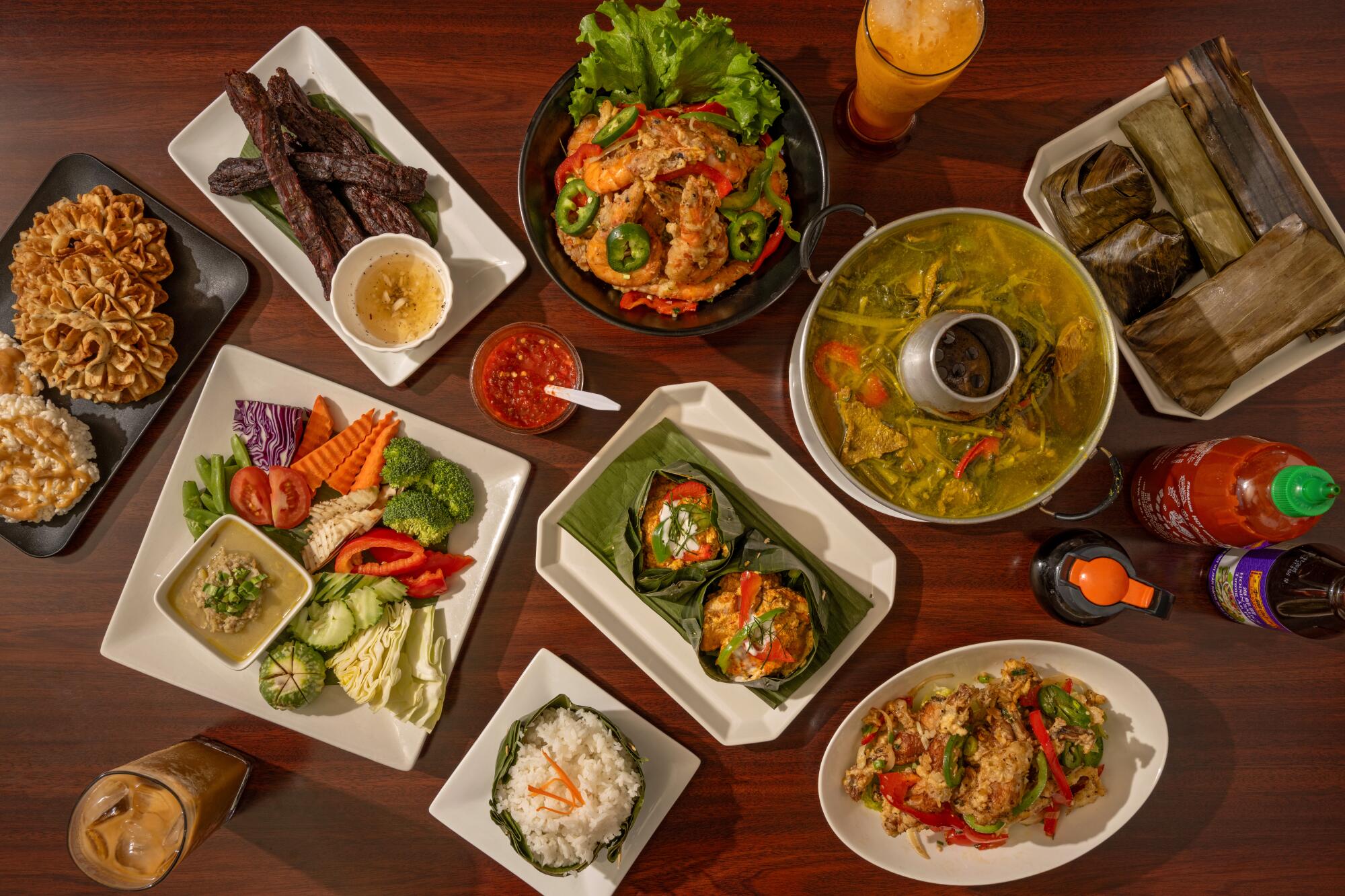
A spread of dishes at Sophy’s: Cambodia Town Food & Music, including ahmok, salt and pepper shrimp, beef jerky, somlaw machu kreoung, tuk kreoung Khmer and some popular desserts.
(Ron De Angelis / For The Times)
If the kitchen isn’t too busy, your ahmok will arrive in bowls fashioned out of bent banana leaves. If it is busy, you’ll get a porcelain dish. Regardless of the vessel, Khut says the steamed fish curry is the most famous dish in Cambodia. She simmers catfish fillets in coconut milk laced with lemongrass, galangal, fingerroot, makrut lime fruit and its leaves. The curry is thickened with enough egg to transform it into a quivering custard that capitulates at the slightest touch of your spoon.
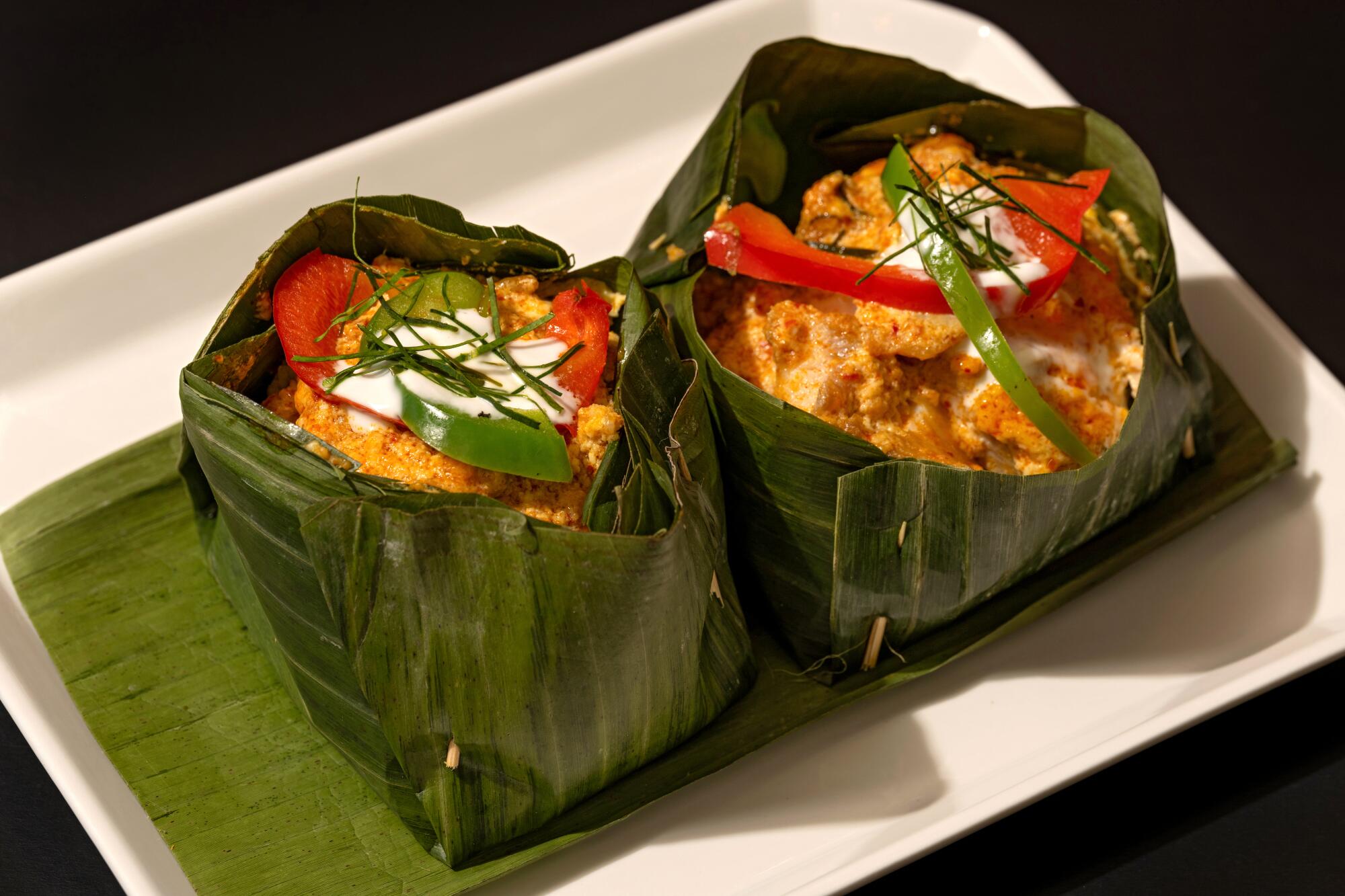
Ahmok at Sophy’s: Cambodia Town Food & Music.
(Ron De Angelis / For The Times)
Pungent is not a powerful enough word to accurately grasp the shock that accompanies the beef tuk prahok. The pale brown sauce, intended as a dip for the steak, is super charged with the funk of fermented fish, a staple ingredient in Cambodian cooking. It’s blended with an onslaught of shallots, grilled garlic and lemongrass, but its severity remains immutable. The slices of raw eggplant, cabbage and green beans presented with the dip help mellow, only slightly, the rank thunderbolt that hits your tongue. This stuff will make your eyes water and you’ll keep coming back for more.
The tuk kreoung Khmer is tamer, made with boiled fermented fish and grilled fish. It’s muddy and wonderfully sour, with a tumble of fresh herbs and chunks of grilled fish crowding the bowl. Like the beef tuk prahok, it’s served with a variety of raw vegetables. It’s also good spooned over white rice.
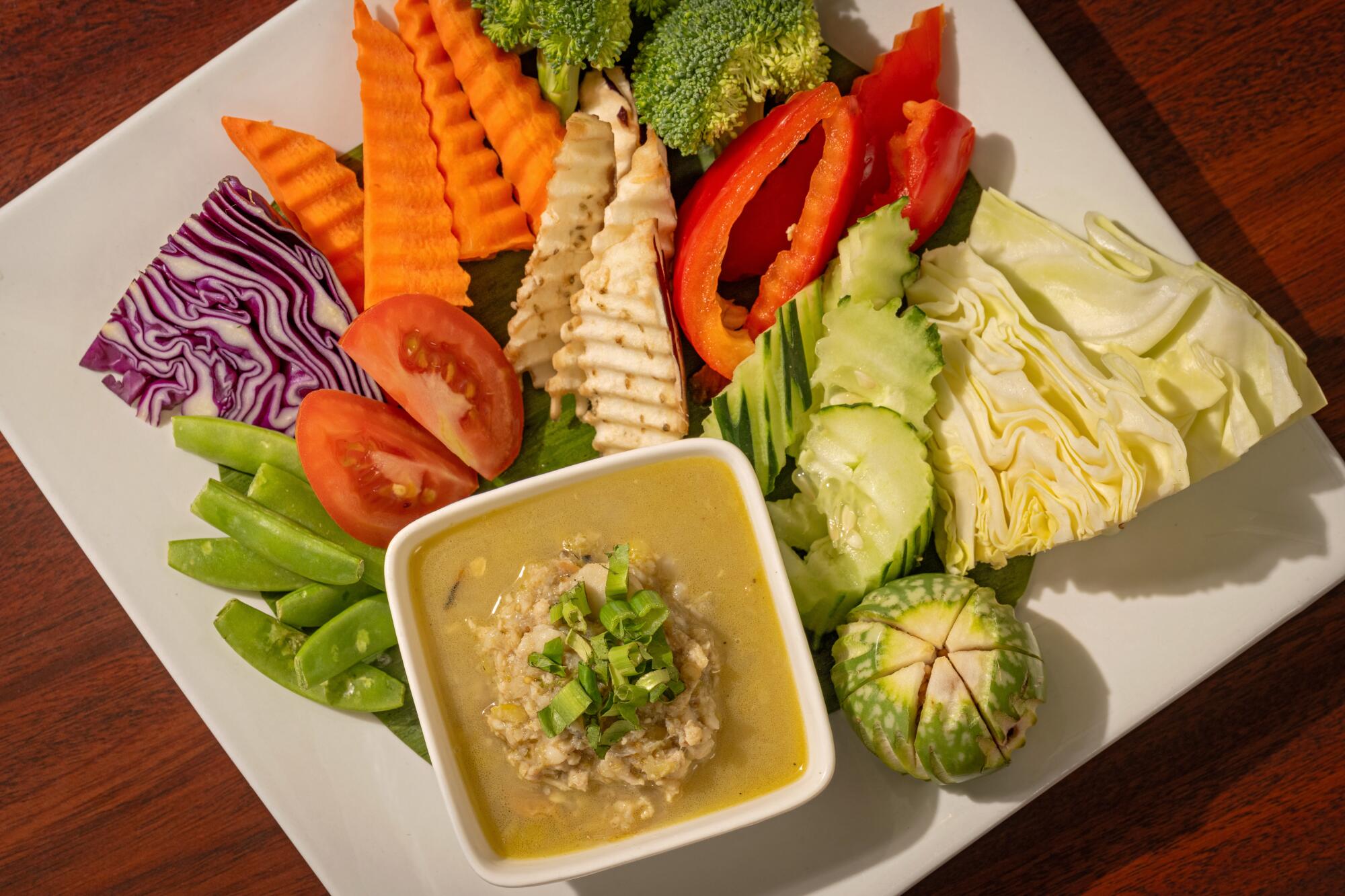
Sophy’s tuk kreooung Khmer, a “wonderfully sour” dip for raw vegetables.
(Ron De Angelis / For The Times)
Fermented fish is the not-so-discreet supporting character in the somlaw machu kreoung, adding a fishy backbone to the bright green soup. A paste of lemongrass, garlic, galangal, makrut lime, turmeric and tamarind makes for a potent elixir that Khut says is intended to cure a cold or flu. If you order the soup with beef or pork, expect any moisture to leach out into the broth, rendering the chunks as mostly garnish.
Like all the soups at the restaurant, it’s served bubbling in a silver vat with a jumping flame that heats the vessel through the middle.
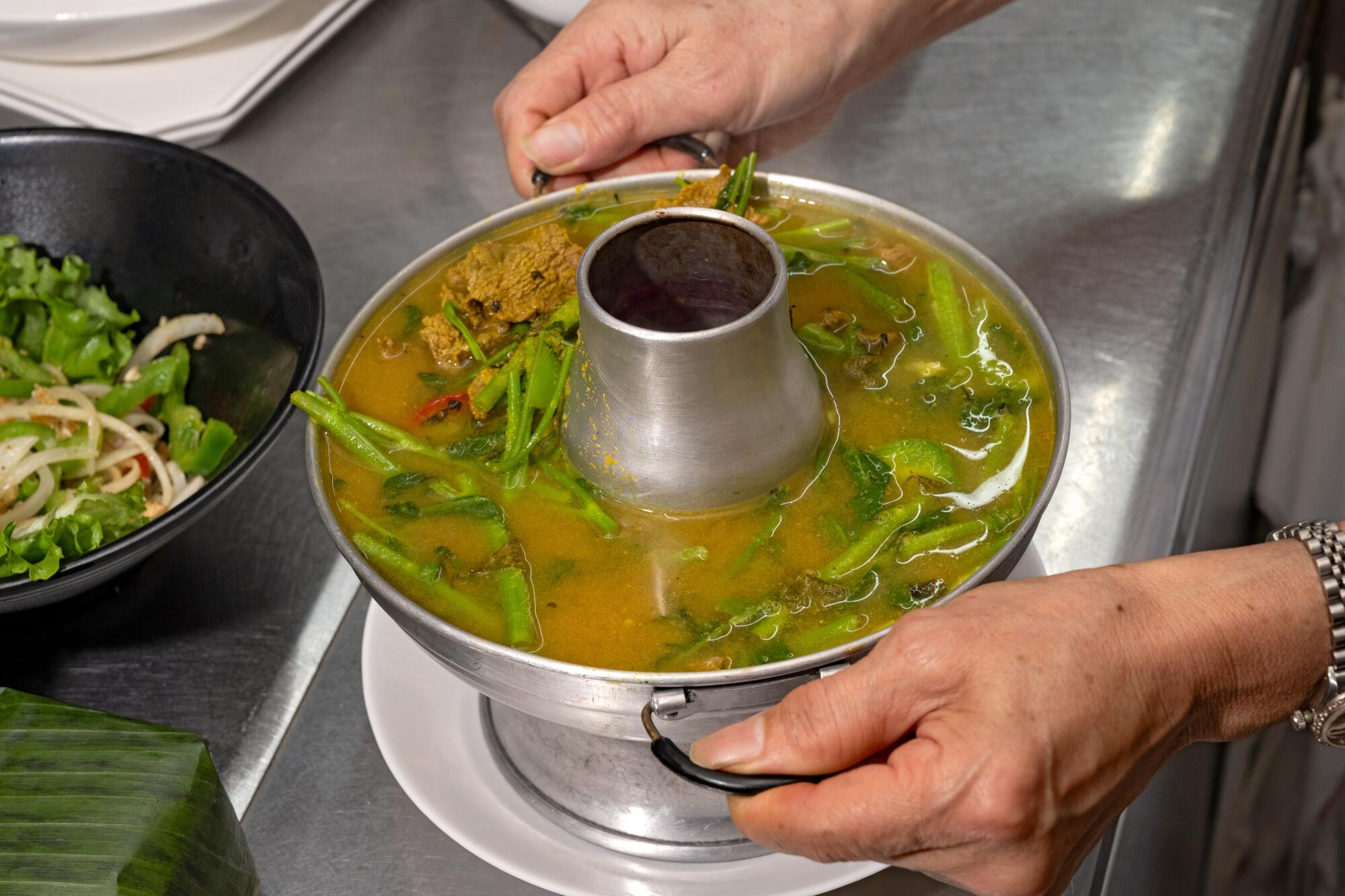
The somlaw machu kreoung, like all the soups at Sophy’s, arrives steaming hot in a heated serving pot.
(Ron De Angelis / For The Times)
The tom kha, a coconut curry soup you’ll find at most Thai restaurants, is decidedly better here than any version in recent memory. Each spoonful veers from sour to sweet and then spicy for a particular amalgamation of flavors that’s both familiar and intoxicating.
If you’re in the mood for noodles, steer clear of the chah mi katahng. The thick gravy will drown out any char on the fat rice noodles and engulf the vegetables in its viscous depths. I prefer the Phnom Penh noodles, ordered dry. The thin rice noodles are chewy and slick with what tastes like garlic oil, tangled in a bowl with pork to the fourth power (ground, sliced, patty and meatball) along with shrimp and plenty of cilantro and bean sprouts. The dry version comes with a fortifying bowl of chicken and pork bone broth that smacks of roasted garlic.
Sip, slurp and repeat.
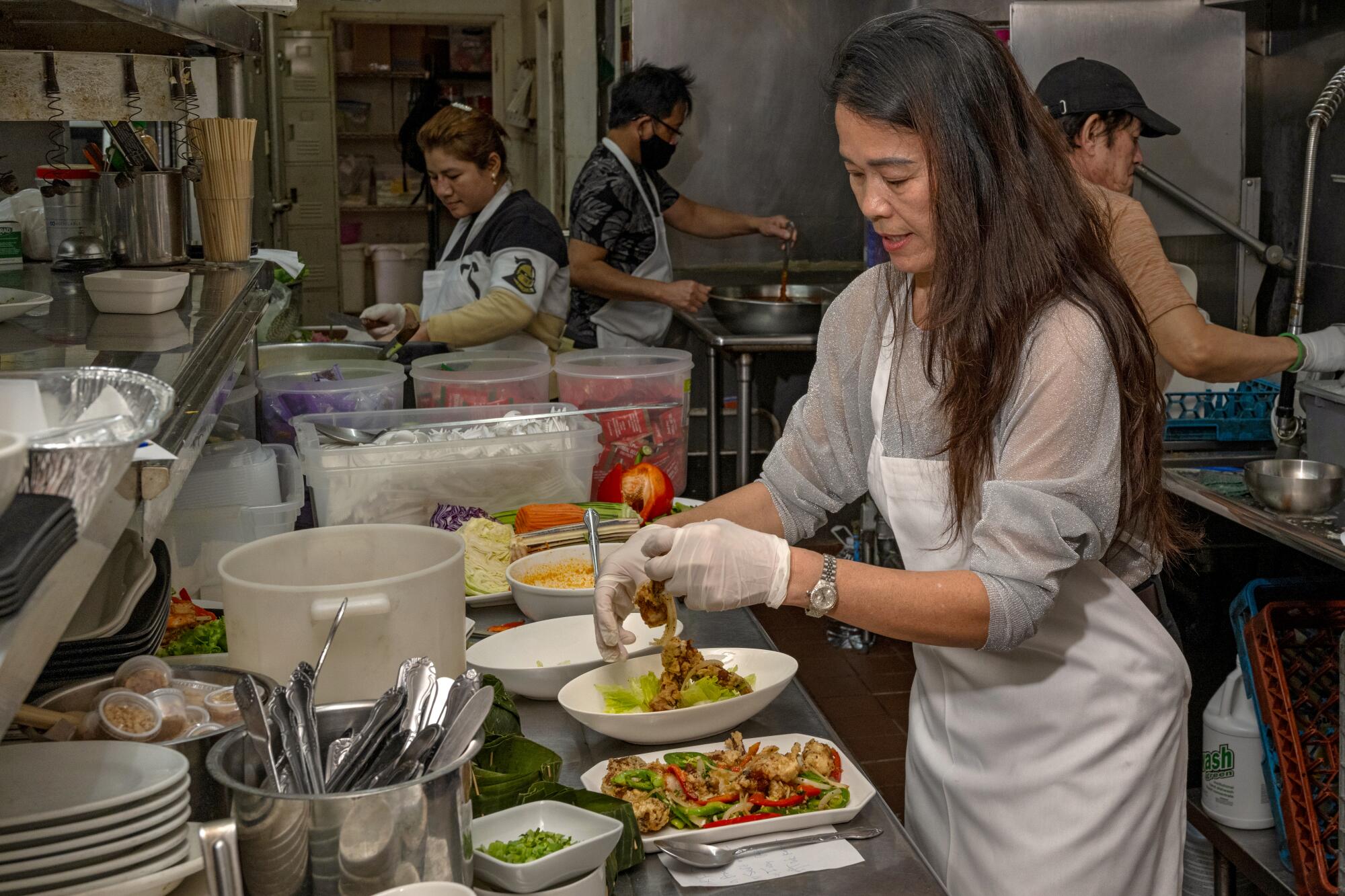
Chef Sophy Khut in the kitchen at Sophy’s: Cambodia Town Food & Music.
(Ron De Angelis / For The Times)
The beef lok lak is almost unrecognizable from the plates you’ll find at some of the other Cambodian restaurants in the area, where the beef is cut into chunks and accompanied by a small mound of salt and pepper next to a few wedges of lemon or lime on a plate. Khut’s rendition is served as tender shavings of flank steak that she cooks with a secret house sauce buttressed by chicken bouillon, ginger and garlic. A sprinkle of cornstarch helps the sauce adhere to the meat like a glaze. It’s served alongside a dipping sauce of lime and fresh-cracked Kampot peppercorns. With a heap of fresh lettuce underneath, you can eat it like a salad.
The black-pepper frog legs are the preferred crunchy escort for an icy bottle of Angkor lager. They’re lightly battered, tender as chicken thighs and fervent with black pepper, garlic and jalapeño.
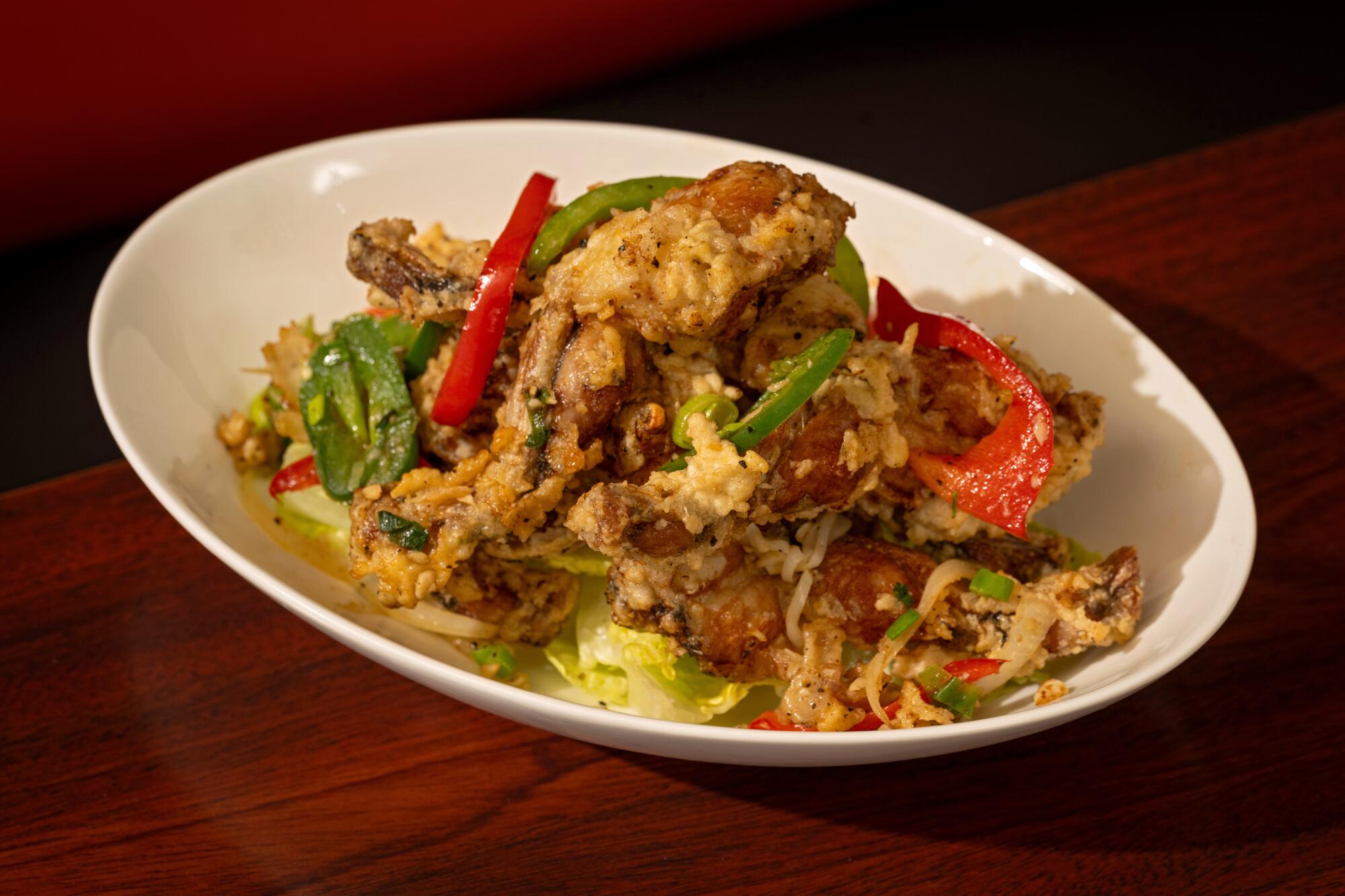
Sophy’s pepper frog legs.
(Ron De Angelis / For The Times)
Dessert comes in the form of fried bananas or mango with sticky rice, but focus on the off-menu items on a small counter at the front of the dining room. The tiers of banana-leaf-wrapped desserts sit next to bags of Kampot peppercorns for sale, cylinders of rice flour cookies and Ziploc bags full of steamed peanuts.
Most of what Khut has on offer are a form of sticky rice cake wrapped around a fruit filling.
The nom kum is the only one shaped like a triangle, with a rice cake so sticky it’s difficult to dislodge from its wrapper or your fork. Inside is a sandy, sweet mixture of shredded coconut, palm sugar and sesame seeds.
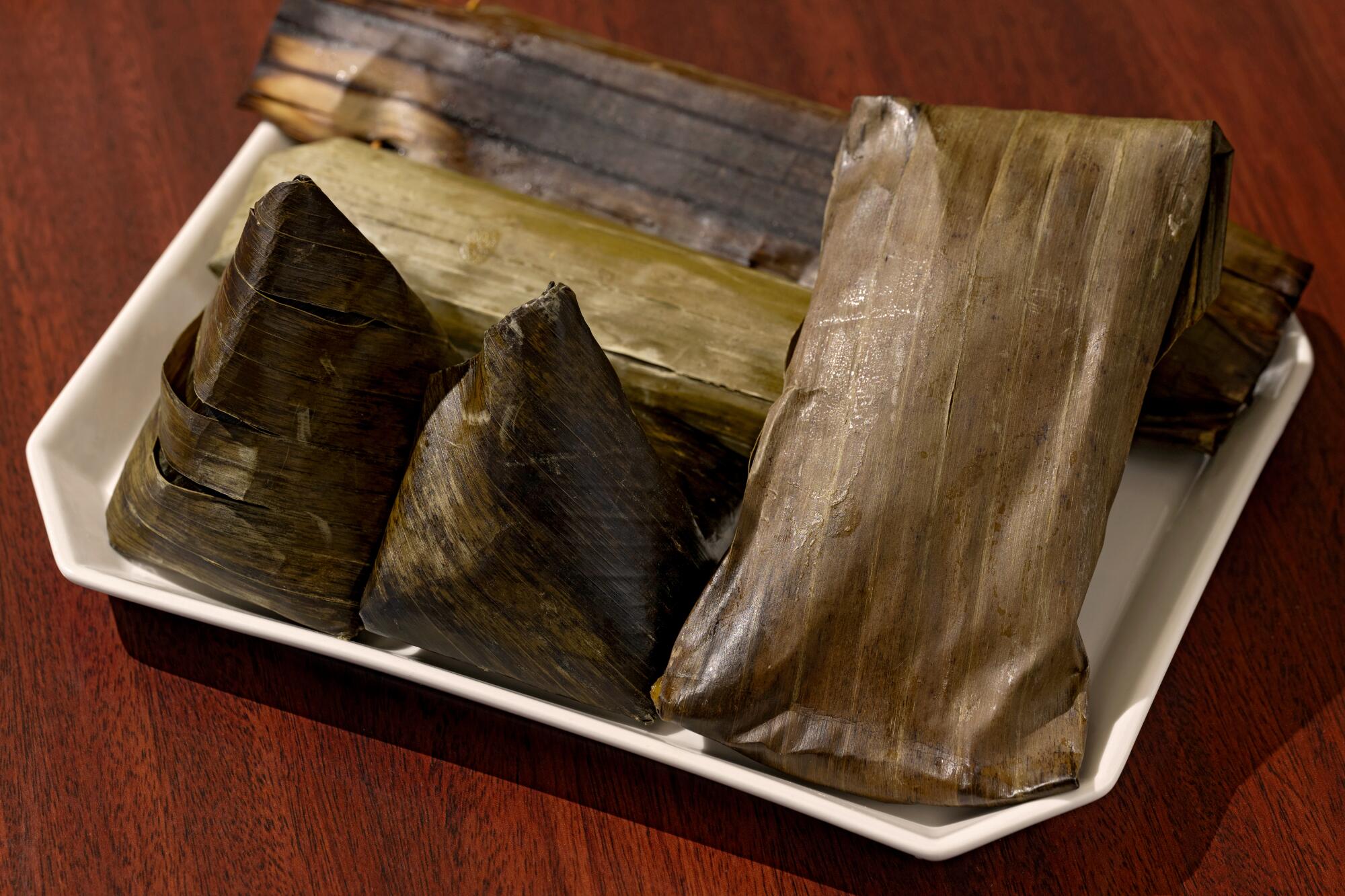
The desserts at Sophy’s include banana-leaf-wrapped sticky rice cakes.
(Ron De Angelis / For The Times)
On a busy weekend, it’s not uncommon to spot a child reaching up to pluck a nom kum or banana-filled rice cake dessert to take back to a table.
There’s a sense of ownership in the families who gather and in the kids who run around the restaurant as if it were their living room. The front area is lined with booths set in about two feet from either wall, creating two narrow walkways that run the length of the room. During a recent visit, kids ran up and down the gaps between the tables.
Indeed, in many ways, Sophy’s is a place that feels like it belongs to its community, with music posters advertising upcoming concerts fixed to the walls and a large picture of a local theater with the words Cambodian Film Festival lit up on the marquee. Though music is in the name, Khut says most of the music happens in the back banquet room during private parties, or when Dengue Fever, an American band that sings Cambodian rock music, comes to town.
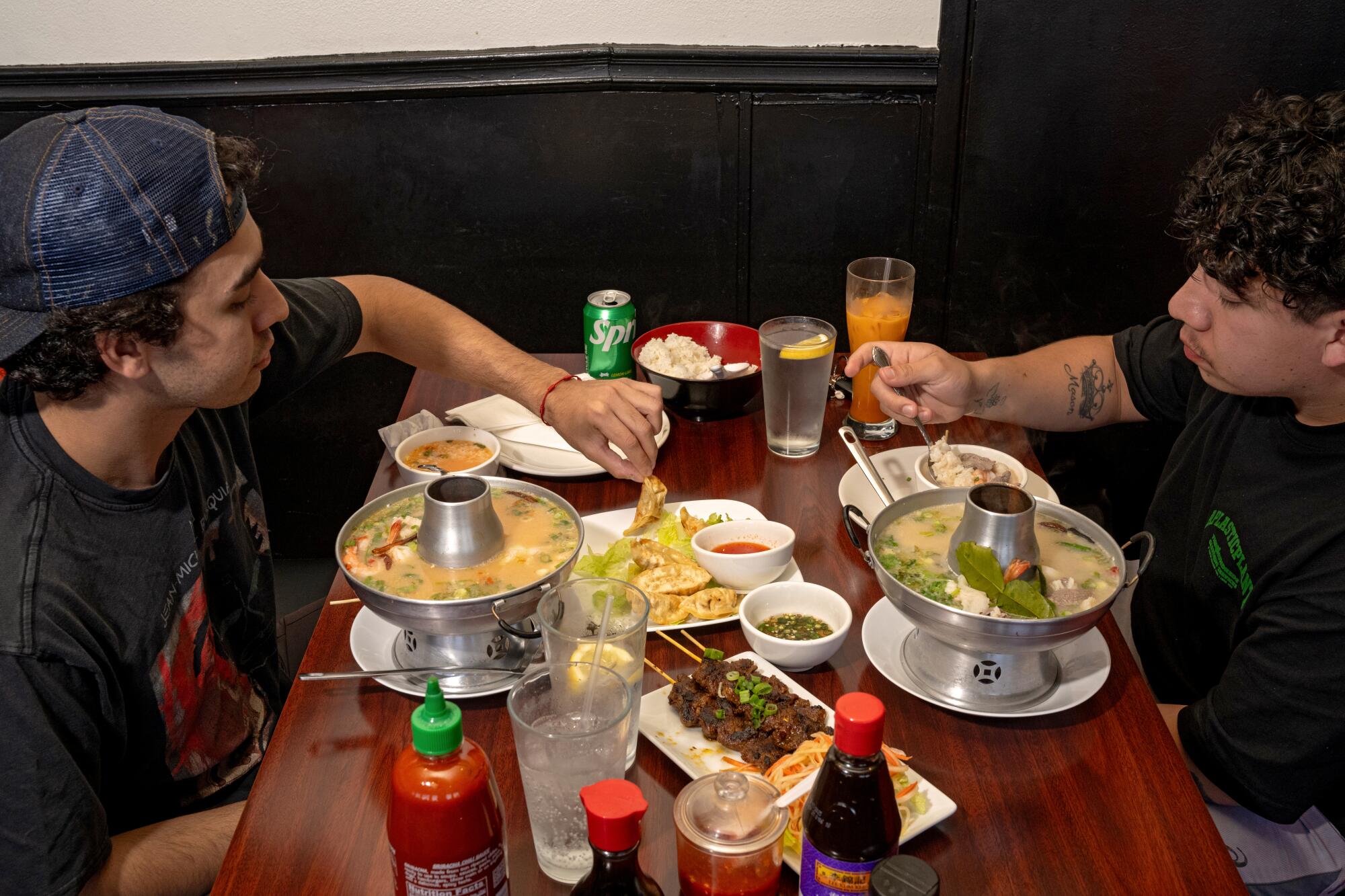
Diners at Sophy’s: Cambodia Town Food & Music.
(Ron De Angelis / For The Times)
Depending on what you order, and the time you dine, each visit to Sophy’s can feel like you’re experiencing an entirely new restaurant. But it doesn’t matter what time it is or who is at the table across from you. Just remember one thing: Order the beef jerky.
Sophy’s: Cambodia Town Food & Music
3240 E. Pacific Coast Hwy., Long Beach, (562) 494-1763
Prices: Appetizers $11-$17, salads $15-$20, entrees $12-$40, desserts $2-$11
Details: Open daily from 10 a.m. to 9 p.m. Beer and wine. Back parking lot and street parking.
Recommended dishes: Beef jerky, ahmok, tuk kreoung Khmer, tom kha, black pepper frog legs, Phnom Penh noodles dry and nom kum for dessert.
